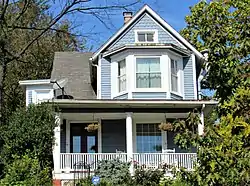Slowe-Burrill House
The Slowe-Burrill House is a Queen Anne-style house in the Brookland neighborhood of Washington, D.C. Built in 1890, the home was occupied from 1922 to 1937 by Lucy Slowe and Mary Burrill, notable African American educators who are thought by historians to have been a couple. The house was listed on the National Register of Historic Places in 2020 for its significance to African American and LGBT history.
Slowe-Burrill House | |
 Slowe-Burrill House in 2020 | |
  | |
| Location | 1256 Kearny Street, N.E., Washington, D.C. |
|---|---|
| Coordinates | 38°55′51″N 76°59′20″W |
| Built | 1890 |
| Architectural style | Queen Anne |
| NRHP reference No. | 100005324[1] |
| Added to NRHP | October 5, 2020 |
History
The house at 1256 Kearney Street NE was built for the original owner James T. Ward, an Irish immigrant, in 1890. It is a two-and-a-half-story structure in Queen Anne style.[2][3][4][5]
Lucy Slowe and Mary Burrill, two African American educators, bought the house together in 1922 after Slowe was appointed Dean of Women at Howard University.[2][6]
At a time when lesbian relationships were extremely taboo, Slowe and Burrill kept their romantic relationship under wraps professionally, but their close friends treated them as a couple.[6][5] They frequently used the property's spacious rear yard for social gatherings of African-American women intellectuals.[3][4]
Howard president Mordecai W. Johnson at one point pressured Slowe to move onto campus, but she fought to remain in the house at 1256 Kearney.[3] The pair lived there together for 15 years until Slowe's death in 1937, after which a mourning Burrill sold the house and moved into an apartment near Howard.[2][7]
The D.C. Preservation League sought preservation status for the house based on the historical significance of its former occupants.[8][9][10] It was listed on the National Register of Historic Places on October 5, 2020.[11]
See also
References
- "National Register Information System". National Register of Historic Places. National Park Service. July 9, 2010.
- "Slowe-Burrill House Nominated to DC Inventory of Historic Sites". DC Preservation League. Retrieved 2020-12-06.
- "Slowe-Burrill House" (PDF). United States Department of the Interior National Park Service / National Register of Historic Places Registration Form.
- Verongos, Helen T. (2020-10-01). "Overlooked No More: Lucy Diggs Slowe, Scholar Who Persisted Against Racism and Sexism". The New York Times. ISSN 0362-4331. Retrieved 2020-12-06.
- Schmidt, Samantha (2019-03-26). "This pioneering Howard dean lived with another woman in the 1930s. Were they lovers?". Washington Post. ISSN 0190-8286. Retrieved 2020-12-06.
- Beemyn, Genny, 1966-. A queer capital : a history of gay life in Washington, D.C. New York. ISBN 978-0-415-92172-5. OCLC 369140942.
{{cite book}}: CS1 maint: multiple names: authors list (link) - Cobb, Elizabeth; Curl, Jordyn (2018). "Biographical Sketch of Mary P. Burrill". Alexander Street. Retrieved 2020-12-06.
- Franklin, Jonathan (2020-01-03). "A pioneer Howard dean lived with her ived with her partner in the 1930s. Now, their house could become a new DC landmark". WUSA9. Retrieved 2020-12-06.
- "Follow Up: Brookland's Slowe-Burrill House Gains Historic Designation". The Brookland Bridge. 2020-05-02. Retrieved 2020-12-06.
- Lynn, Kellye (2020-02-26). "Push for Preservation: Home of 1920's African-American educators could become DC landmark". WJLA. Retrieved 2020-12-06.
- "Weekly List 20201009". National Register of Historic Places (U.S. National Park Service). 2020-10-09. Retrieved 2020-12-06.